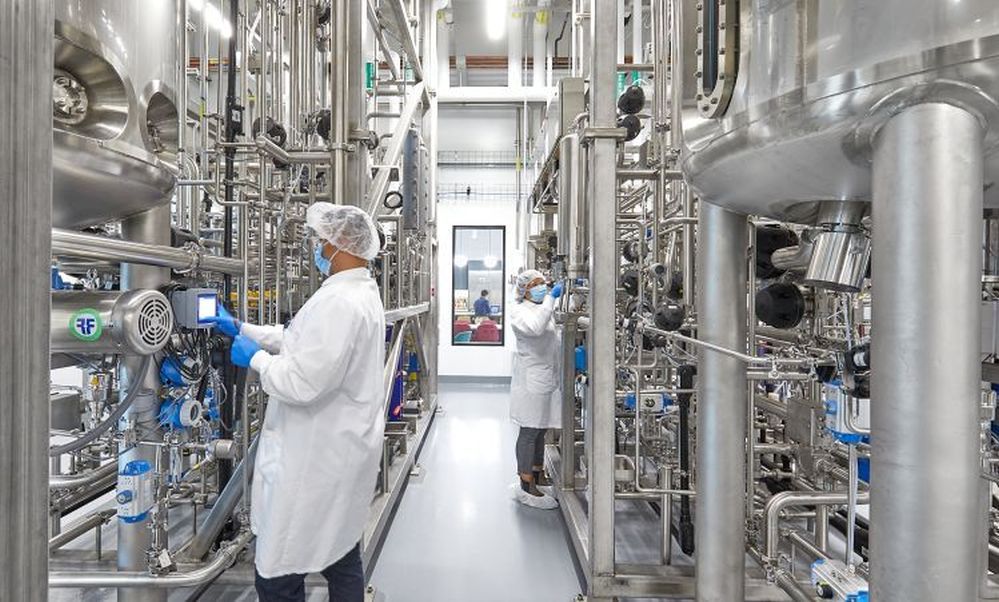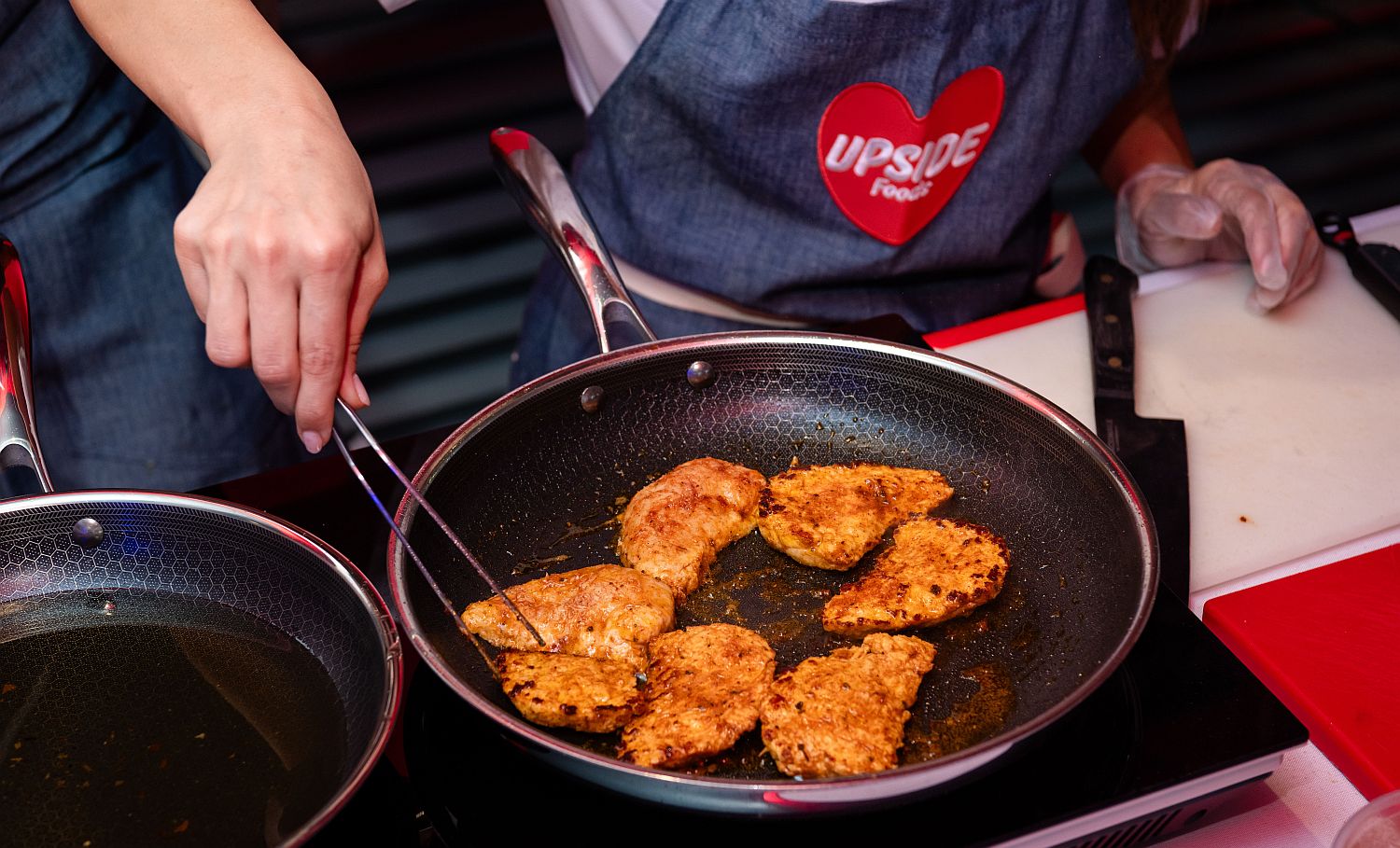Cultivated meat pioneer UPSIDE Foods has engaged in a new round of layoffs as part of a restructure, AgFunderNews understands.
In a statement to AgFunderNews sent this afternoon as employees announced they were seeking new roles on LinkedIn, a spokesperson said: “We’ve reorganized our team and operations to focus on commercialization and scale while staying agile and efficient to meet any challenges ahead.”
The spokesperson confirmed that there had been layoffs but did not provide any numbers or further detail on the reorganization.
The move follows layoffs in February and July 2024 at the firm, which has paused plans to build a large-scale facility in Glenview, Illinois, in favor of expanding its smaller “EPIC” site in Emeryville, California. Scaling up the EPIC plant—which opened in late 2021 —will cost “substantially less” than building the first phase of the larger plant in Glenview, said the firm at the time.
Costa Yiannoulis, managing partner at foodtech investor Synthesis Capital, told us: “As an investor in UPSIDE Foods, I am glad it is being proactive and focusing on scaling while reducing burn to maintain a multi-year runway. In this capital environment for a novel industry that is scaling for the first time (like cultivated meat), this is what investors expect to see.”
What next for large-scale production of cultivated meat in the US?
UPSIDE Foods— which has raised $608 million since 2015—has acknowledged that its whole cut technology (for which it has secured regulatory approval in the US) is not yet ready for prime time.
However it has shared more bullish comments about its hybrid approach to cultivated meat whereby it grows animal cells in suspension in 2,000-liter bioreactors and then combines them with plant-based meat to create processed products such as nuggets and patties. This approach has yet to secure regulatory approval, however.
As part of the expansion at its EPIC facility, UPSIDE had planned to add larger cultivators that would demonstrate its ability to transfer its process into “successively larger and more efficient scales while maintaining the taste, quality, and safety that we have been able to consistently achieve at the 2,000-liter scale.”

Industry at a crossroads
With private funding almost drying up in 2024 with a couple of exceptions (here and here) and key players warning that the sector could struggle to survive without a massive influx of public money, cultivated meat startups are currently swimming in troubled waters.
Speaking at the cellular ag innovation day at Tufts University in January, Steve Simitizis of early-stage agrifoodtech investor Solvable Syndicate noted that “the science is much further along than it was even two years ago, but valuations are at their absolute lowest.”
Political sentiment is also souring in the US, with several states either banning cultivated meat (Florida, Mississippi, Alabama) or seeking to, while HHS secretary Robert F Kennedy Jr. has made it clear he’s not in favor.
On a more positive note, however, Mission Barns recently secured an FDA ‘no questions’ letter regarding the safety of its cultivated pork fat, with founder Eitan Fischer expressing hope that it might generate “new momentum, not just for us, but for the entire industry.” Israeli firm Ever After Foods, meanwhile, says novel bioreactors could slash capex and opex costs, while SuperMeat recently released a report which iit claimed offered “proof that with the right technology there is a commercially viable path to market.”
AgFunder data shows that funding for cultivated meat startups peaked at $989 million in 2021, dipped to $807 million in 2022 and then fell to $177 million in 2023.
Worryingly for startups in the space, things did not pick up in 2024. AgFunder data indicates just two notable rounds in the sector (Mosa Meat’s $43 million raise in April and Ever After Foods’ $10 million raise in June) and undisclosed rounds for Hoxton Farms, Meatly and Meatosys.
GOOD Meat: New model required for large-scale profitable production
Fellow cultivated meat pioneer Eat Just, which has raised $270 million to support its GOOD Meat cultivated meat division, has secured regulatory approvals for cell-cultivated chicken in Singapore and the US, but has not yet landed on a model for profitable production at large scale, acknowledged founder and CEO Josh Tetrick.
Speaking to us earlier this week, Tetrick said he is not attempting to raise money for a large-scale cultivated meat facility right now and is instead focusing on process development and new cell lines that he claims will enable more efficient large-scale production.
“We think for cultivated meat to be viable, you’re going to have to build large scale facilities in the $100 million or so dollar amount, not in the hundreds of millions. So our energy is spent thinking through what a system that would enable that looks like.
“We’re still selling at Huber’s Butchery in Singapore and there was utility in that [getting product in front of consumers] but it doesn’t do us a lot of good to continue selling [a loss-making product] at the smallest scale.”
Believer Meats: Awaiting regulatory approval
Believer Meats, which is building what it claims is the “largest cultivated meat production facility in the world” in North Carolina, had previously said the site would be “operational by the end of 2024.” The firm, which has not yet secured regulatory approvals to sell cultivated meat products in the US, has not provided an update in recent weeks.
Further reading:
Inside the UK cultivated meat regulatory sandbox with Mosa Meat, Hoxton Farms, and BlueNalu
Breaking: Eat Just/GOOD Meat to pay ABEC $4.4m to settle legal dispute
Breaking: Mission Barns secures FDA approval for cultivated fat, gears up for US launch
ProFuse Technology expands focus from cultivated meat to drug discovery amid GLP-1 drug boom
Cultivated Meat at a crossroads: Highlights from the Tufts cell ag innovation day





